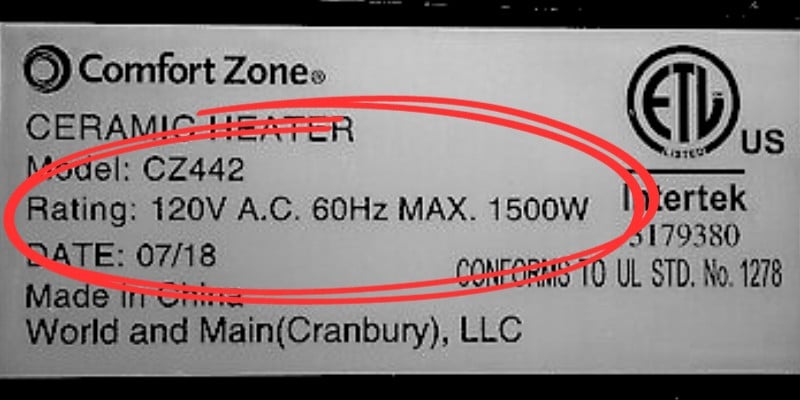The chill of winter sends many of us scrambling for ways to stay warm. One such method is using space heaters, often seen as lifesavers in colder climates. But, as with all electronic devices, it’s essential to understand how much power they consume. Why? To strike a balance between comfort and safety.
Every device you plug into an outlet consumes power. The amount of power determines how much you’ll pay at the end of the month. Depending on its power rating and usage, a space heater can be a major contributor to your electric bill, especially if used extensively during colder months.
When it comes to space heaters or any appliance, the amount of watts they consume can directly influence your electricity bill. Think of watts as the fuel your heater needs to function—the more fuel it consumes, the higher the cost.
Wattage, in simple terms, refers to the power an electronic device uses. So, how many watts does a space heater use?
Space Heater Power Rating
Space heaters come with a power rating, usually given in watts. This rating indicates the maximum power the heater can consume when running at full capacity.

What Does Power Rating Tell Us?
The power rating of a space heater offers insight into its heating capability. A higher power rating typically means that the heater can produce more heat. However, it also means that it will consume more electricity.
For instance, a space heater with a power rating of 1,500 watts will consume more power and generally produce more heat than one with a rating of 750 watts.
It’s essential to choose a heater with a power rating that matches your room’s size and insulation quality. A heater that is too powerful for a small room may waste energy. In contrast, a heater with a low power rating might not warm a large room effectively.
Factors Affecting a Space Heater’s Wattage
1. Size of the Room
It’s logical: larger rooms need more heat. However, the exact power requirement depends on volume, ceiling height, and room shape. For instance, a high-ceilinged room might require a more powerful heater than a low-ceilinged room of the same floor area.
2. Temperature of the External Environment
The colder it is outside, the harder your heater has to work. On a particularly frigid day, your space heater will likely use more watts to maintain a cozy room temperature.
3. Insulation of the Room
Insulation acts like a blanket, trapping heat inside. Rooms with better insulation retain heat more efficiently, requiring less power from the heater.
4. Heater’s Thermostat Setting
Like with your central heating, the higher you set the thermostat on a space heater, the more power it consumes. Finding a balance that’s comfortable yet energy-efficient can save you money.
Estimating Space Heater Power Consumption: A Basic Guide
Have you ever wondered how much your space heater adds to your electricity bill? Let’s break it down.
If you’re using a 1,500-watt space heater for 5 hours, it consumes 7,500 watt-hours (1,500 watts x 5 hours). To make this figure more relatable to your electricity bill, convert it to kilowatt-hours (kWh) by dividing by 1,000.
So, 7,500 watt-hours becomes 7.5 kWh. Multiply this by your electricity rate (15 cents per kWh), and you get $1.13 for 5 hours of use.
Tips to Reduce the Power Consumption of a Space Heater
- Optimal Placement. Position your heater where its warmth can be best distributed, like the center of a room and away from windows or drafty areas.
- Maintenance is Key. Dust and debris can make your heater work harder. Regular cleaning ensures it runs efficiently.
- Smart Usage. Consider using timers or smart plugs to limit the heater’s operation to the chilliest times of day or night.
- Dress Wisely. Sometimes, adding a sweater or blanket is more cost-effective than turning the heater.
- Invest Wisely. Energy-efficient models may cost more upfront, but they save in the long run with reduced power consumption.
Using space heaters responsibly is crucial. Ensure you’re plugging them into suitable outlets and avoid using extension cords, which can overheat. Also, never cover your heater or place it near flammable materials.
Staying warm doesn’t have to burn a hole in your pocket. By understanding the wattage of space heaters and using them wisely, you can enjoy a cozy winter without the shock of a high electricity bill. Remember, knowledge is power—in this case, it can also mean savings!






